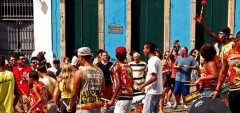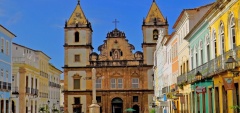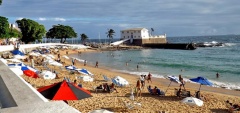Top things to do in Salvador
The Bahian capital of Salvador was my first stop on my two week trip to Brazil. Salvador is Brazil’s second most popular tourist destination after Rio and it’s easy to see why. It was here that the Portuguese founded the first capital of Brazil in 1549 and given its role in the shipment of slaves from Africa to the sugar plantations, today it is the capital of African-Brazil, with around 80% of the population being of African origin. This has created a vibrant and captivating mix of sounds, flavours, and traditions which oozes from all corners of the city.
I was staying at Villa Bahia in the old historical district of ‘Pelourinho’, right in the midst of the two kilometres between the Municipal Square in the south and the Carmelite churches in the north of the district, which are designated a UNESCO World Heritage site and right across of the famous Igreja e Convento de São Francisco, one of the finest Baroque churches in South America. ‘Pelourinho’ means whipping post and refers to the post where African slaves used to be auctioned off and punished by their Brazilian-Portuguese masters.
Like most cities built by the Portuguese, the ‘Pelourinho’ district has steep winding cobbled streets lined with bright pastel-coloured houses, leading to pretty squares which are the centre of community life. Salvador and Bahians are famous for their laid back attitude to life and I was lucky enough to be staying in Salvador over the weekend when the city was in full swing! Chairs and tables fill the main square, Terreiro de Jesus, cool boxes are brought out which are filled with cans of drinks, the ‘churrasqueiras’ or bbqs are lit, live samba starts up and the locals pair off to dance.
With the help of my guide Conor, who has lived in Salvador for nearly 30 years, I was also able to explore the areas adjacent to the coast, such as Barra and Rio Vermelho, and see another side to the city. From the leafy upper-class district of the centre with its numerous theatres, bars and restaurants, to the relaxed beachfront district of Barra and the bohemian area of Rio Vermelho, Salvador is a diverse city and definitely has something to suite most tastes. Not to mention the areas of Bonfim - the site of the famous Nosso Senhor do Bonfim Church - one of the most important churches for both Catholic and Candomblé worshipping Brazilians, and the waterfront Ribeira district which is a popular spot for locals at the weekend who sit back and watch the local fishermen bring in their catch.
Despite Salvador being Brazil’s third largest city, it has seemingly managed to retain its sense of the local and the communal; everyone seems to know everyone else and each member of the community plays their own role. Despite seeming louder and possibly more dysfunctional to the outside eye than other cities in Brazil, for me that’s what makes Salvador stand out; things happen spontaneously and people still make time for each other; whether they’re a close friend or someone they’ve only just met. Furthermore, with an international and domestic airport, stopping off in Salvador before heading on to Bahia’s beautiful beaches, the Chapada Diamantina or other places in Brazil is fairly easy!
If you’d like to hear more about Salvador, send us an email through our site or feel free to give us a call.




